“I respect you.”
As compliments go, that statement is incredibly affirming. The Oxford Dictionary defines respect as “a feeling of deep admiration for someone or something elicited by their abilities, qualities, or achievements.”
Respect is garnered over time, but that doesn’t necessarily mean you need to have a deep relationship with someone to have respect. Respect is unique because it can be felt from afar without much, if any emotional connection. Your abilities, qualities, or achievements can all speak for themselves – how you are perceived is born out of those elements.
In the sporting world, you’ll see many instances where respect is the underlying feeling amongst all concerned parties. Boxing is a prime example of this. For instance, fighters such as Tyson Fury goad their opponent relentlessly in the build-up to the fight. There will be taunts thrown back and forth to market the bout as a ‘real fight’ – a grudge match between two people who must engage in physical combat to sort out their issues with one another. At the outset, it seems personal. Yet it rarely is. In most cases, once the fight is over, the two fighters will embrace and speak glowingly about the other in post-fight interviews. The constant theme mentioned?
Respect.
The pair have gone to war and caused consistent physical harm to one another – they gained each other’s respect throughout the fight. After all, stepping into a ring for a living is no mean feat. So, despite all the seemingly nasty things they’ve said to each other, it ultimately doesn’t matter. They measure each other through their abilities, qualities, and achievements – all of which were on display during the fight.
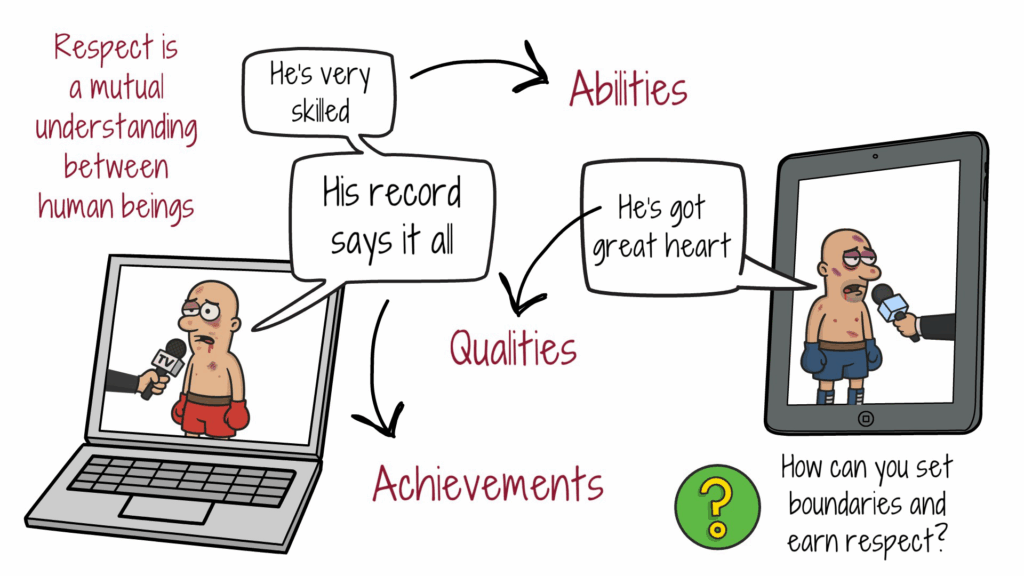
That, in essence, is the beauty of respect. It’s a mutual understanding between human beings that you don’t necessarily need to like or even know, but you can give and earn respect, regardless of your relationship.
How do you do that without undergoing something as gruelling as a boxing match? Here are some ways you can set boundaries and earn respect from those near and far from you.
Learn to say no
Steve Jobs was one of the most famous names to advocate the power of saying ‘no.’ Saying no can feel blunt and rude. Instead of merely being about setting your boundaries, it’s as if you’re denying someone of something vital to them. In most instances, that just isn’t the case. On this, Jobs said the following:
“People think focus means saying yes to the thing you’ve got to focus on. But that’s not what it means at all. It means saying no to the hundred other good ideas that there are. You have to pick carefully.”
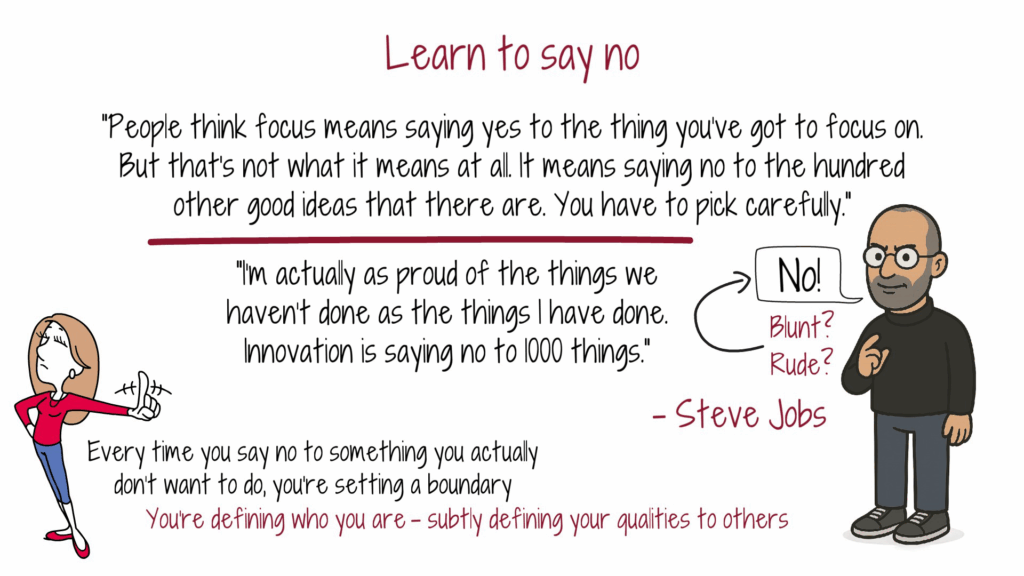
Continuing, he discussed Apple’s forward thinking and innovation:
“I’m actually as proud of the things we haven’t done as the things I have done. Innovation is saying no to 1000 things.”
It’s no secret that Jobs had a somewhat abrasive personality – it’s one of the reasons he was fired by Apple in the 80s. Then again, that is perhaps the point of what he’s discussing here. Saying no is a habit that has irritated some people. However, every time you say no to something you actually don’t want to do, you’re setting a boundary. You’re defining who you are – that is vital in gaining respect from others. Perhaps most importantly, when you say no, you’re subtly defining your qualities to others. Now, some may not like that, but that’s okay. To say no is to respect yourself, and when you respect yourself, others will see that in you.
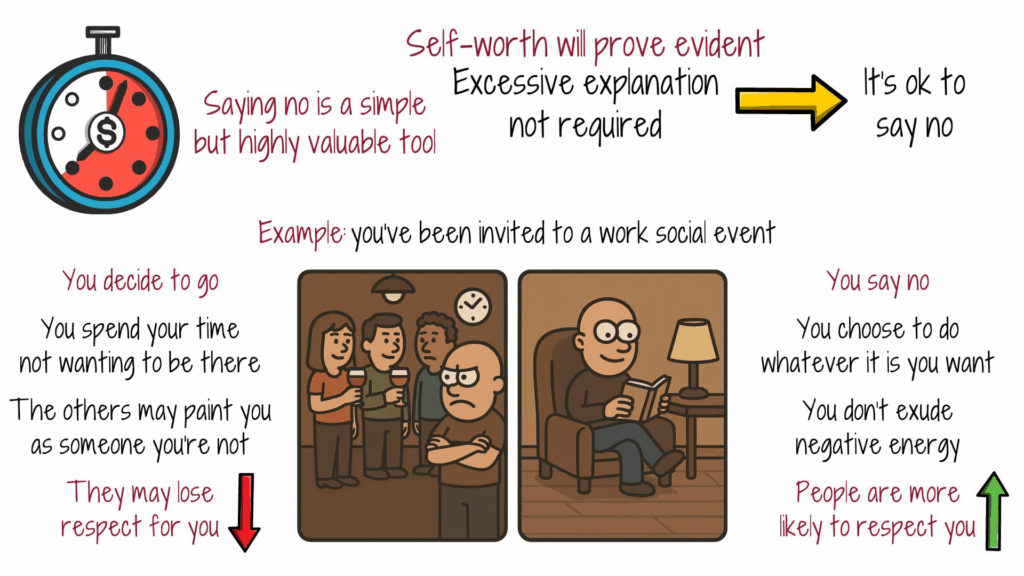
This is important to understand because it’s an incredibly simple but highly valuable tool you can use daily. Let’s put it into context. For example, let’s say you’ve been invited to a work social event celebrating someone who hasn’t treated you very well and, to top it off, there’s drinking involved – something you don’t particularly enjoy. Now, let’s say you decide to go. You spend your time not wanting to be there, thinking about what you could be doing instead. The other people attending might not know or understand the nuances behind your behaviour and paint you as someone you’re not. They may – and this is hypothetical, of course – lose respect for you. Now, in another world, you say no. You don’t go, instead choosing to do whatever it is you want. You don’t attend and exude negative energy, instead choosing yourself. People are more likely to respect you inserting boundaries and, as a result, defining who you are. That gains respect. By not attending, you’re subtly drawing attention to your qualities. Self-worth will prove evident.
This is not to say that you need to even explain why you don’t want to attend. Although a common misconception, you don’t need to offer excessive explanation for yourself – saying no commands boundaries.
Remember, it’s ok to say no.
Accept dislike and recognise different intentions
Another key element to setting boundaries and gaining respect is to accept that not everyone will like you. People are guided by their relationships, surroundings and experiences so there will likely come a time when you don’t align with other people. It’s vitally important to not let that get to you.
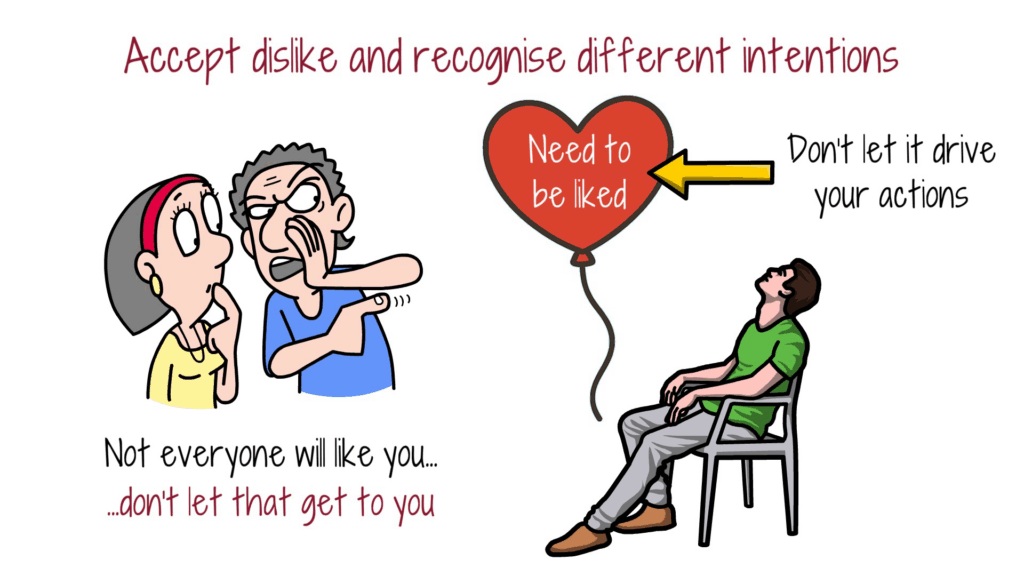
When you understand this, you can let the need to be liked go. Once that happens, you’ll realise just how exhausting it is to be liked and just how much it can drive your actions. It links into the previous point – learning you will be disliked by some people is similar to saying ‘no.’ You’re setting a boundary for yourself – one that won’t allow you to be hurt but will allow you to focus on yourself. In a world where it’s so easy to see other people’s lives online, giving yourself the grace of self-acceptance is a welcome blessing.
Similarly, because you know not everyone will like you, it makes it easier to recognise different intentions. Not everyone has the same heart as you therefore they may experience what you say and do differently to how you originally intended. That is okay. Accepting that is, in itself setting a boundary. You earn respect by respecting that other people have different modes of thinking and, as a result, a different perception of you.
Value yourself
Respect comes from within yourself. It’s simple. To explain let’s look back to the example used earlier. You’ve been invited to work drinks celebrating a person you didn’t get on with, for whatever reason that may be (a rude boss, for instance). You say yes implicitly. You know you don’t really want to go but it feels more comfortable saying yes. You go and it’s not the night you wanted. The lingering feeling? Regret. That’s an understandable reaction. Sometimes we all end up doing things we don’t really want to do, often putting others over ourselves when we perhaps shouldn’t. That is why it’s vitally important you value yourself. When you do, you can appreciate your time and how you choose to use it. Your time is valuable so you should use it to save energy from things that bring you harm. In doing so, you’re also setting boundaries. These help accommodate your energy, ensuring it’s stored and used in the best places rather than unfiltered and wasted.
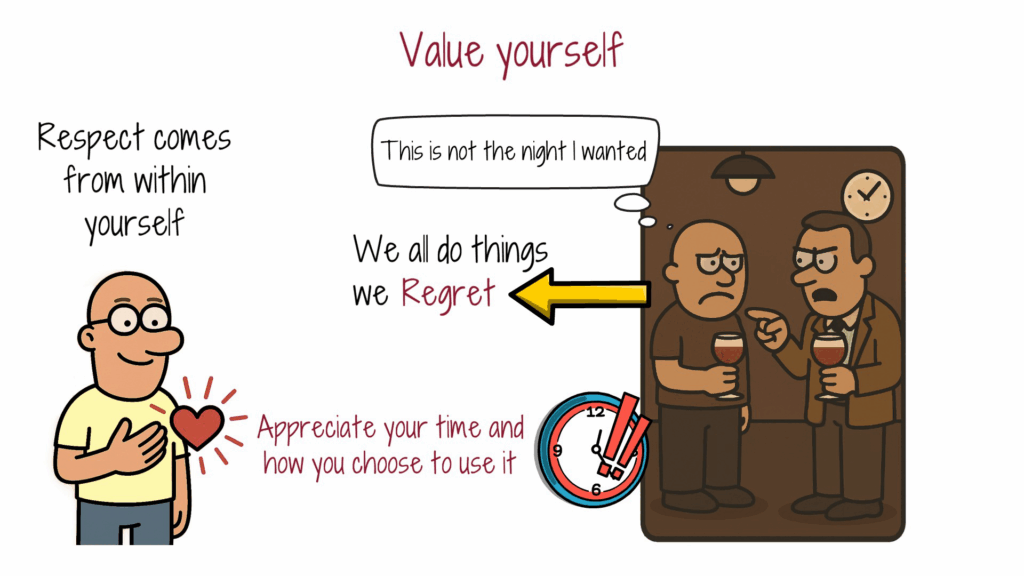
You can start doing this by journaling. Write to yourself, a letter depicting how you want to be treated. Write about what brings you joy. Note down all of the things you did in one day – what felt like a waste of time? How could you have served yourself better? These are questions that shape your boundaries. Boundaries help define your qualities, will target you toward your achievements, and let your abilities shine.
Take baby steps
Practising these changes gradually is key. Any effort to improve yourself is a step by step process that involves resilience and many tests along the way. Saying no might not feel natural for a while, you might find it uncomfortable. Boundaries are the walls that encompass your personality, they’re built through hard work and dedication to yourself.
